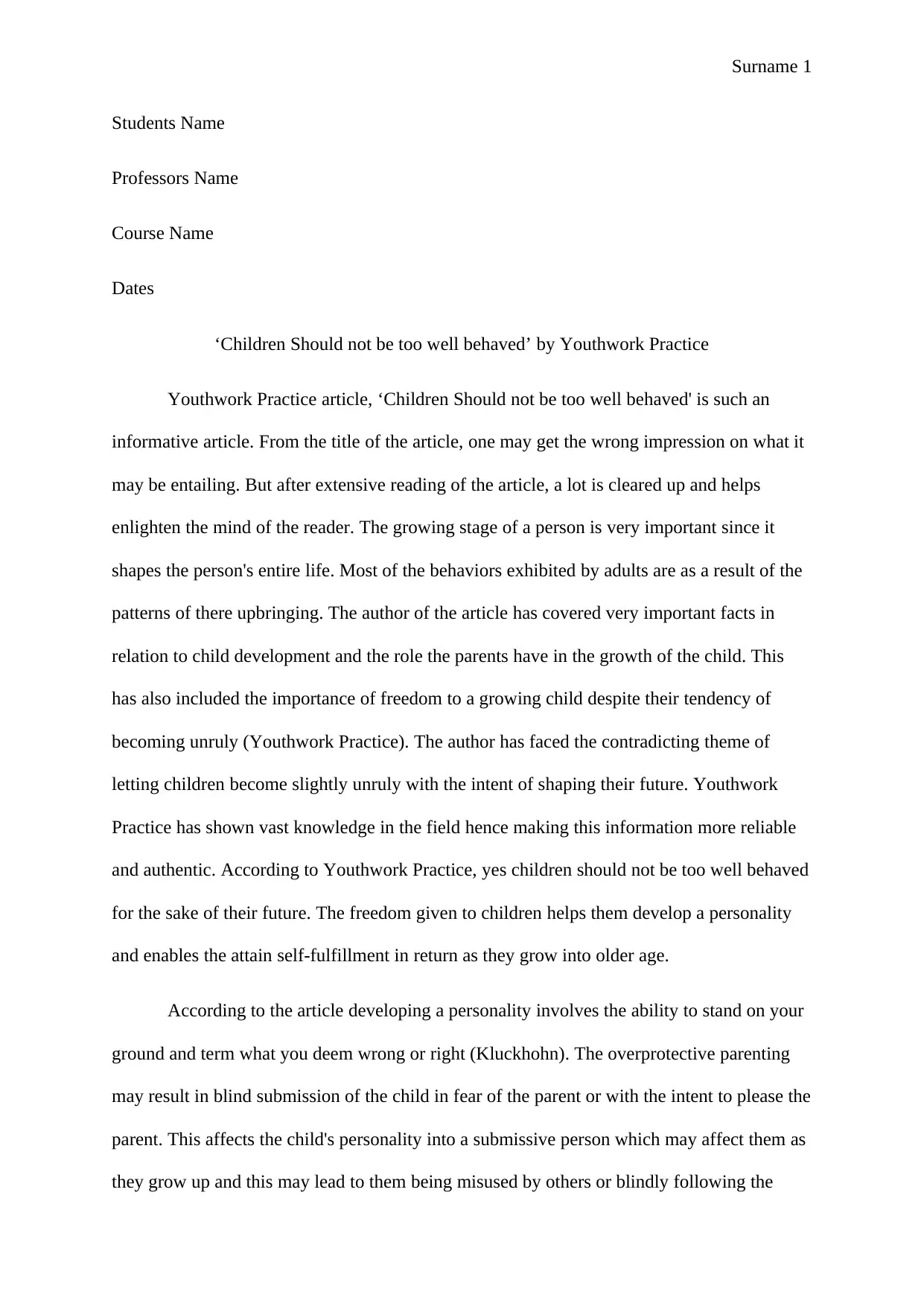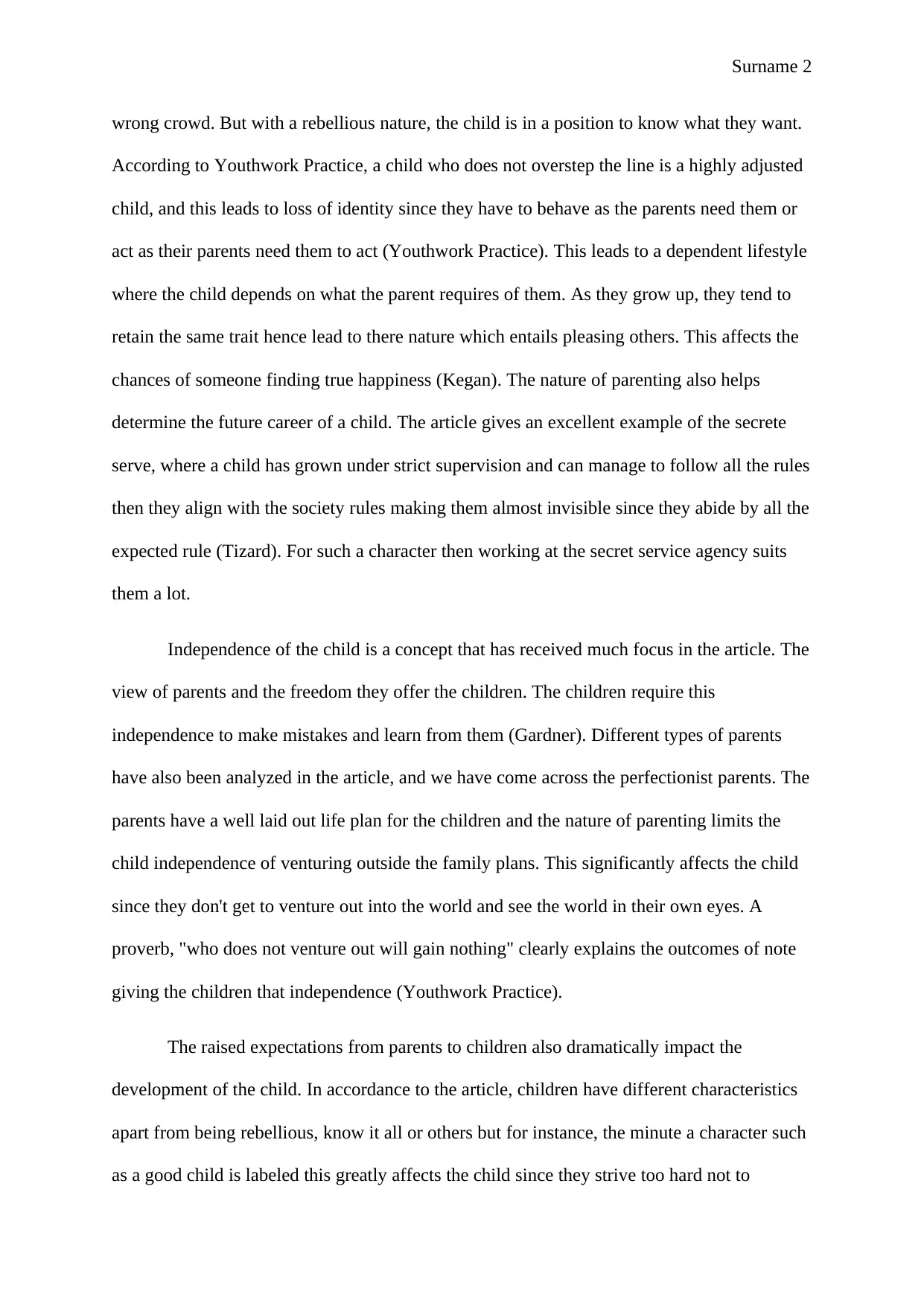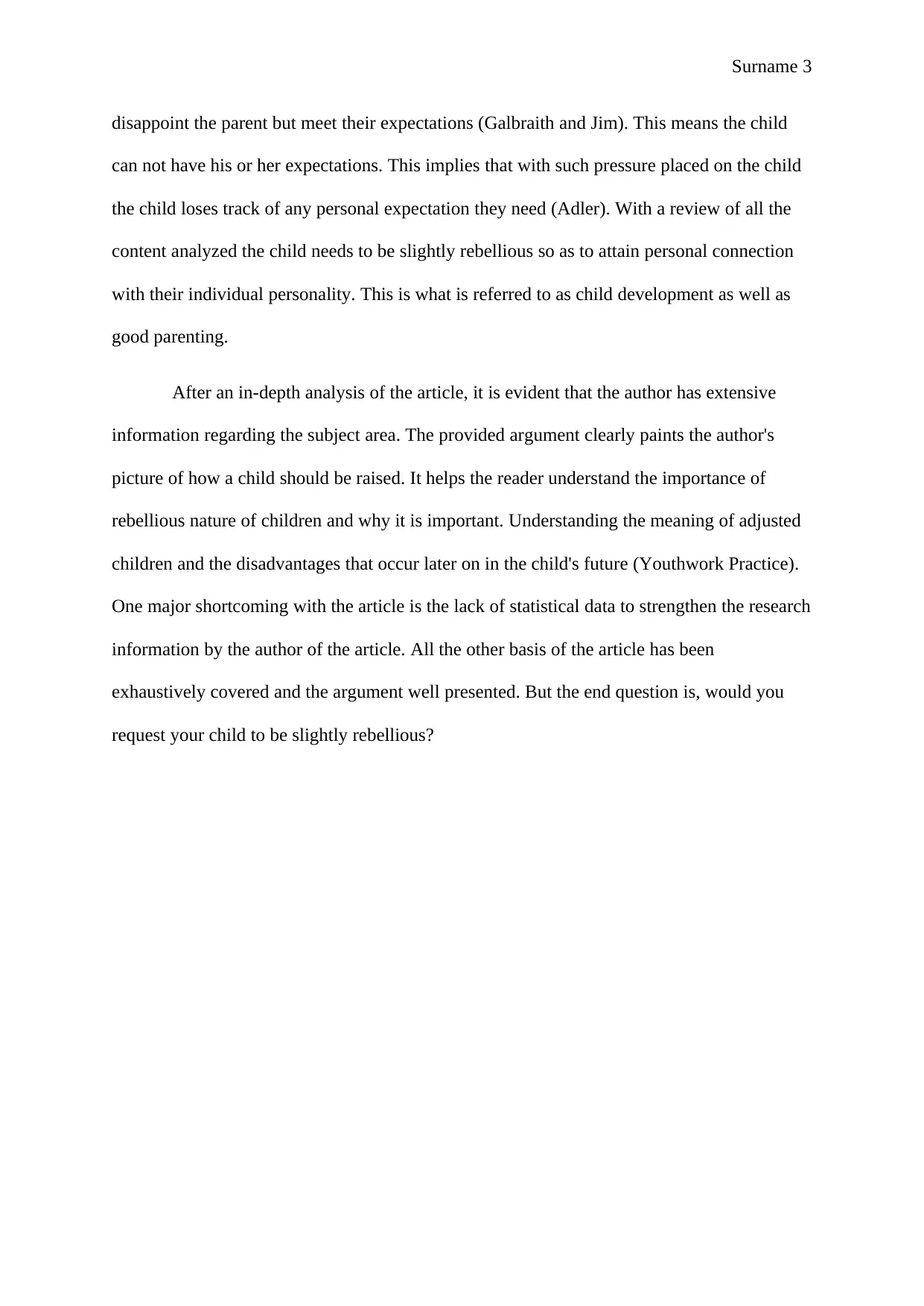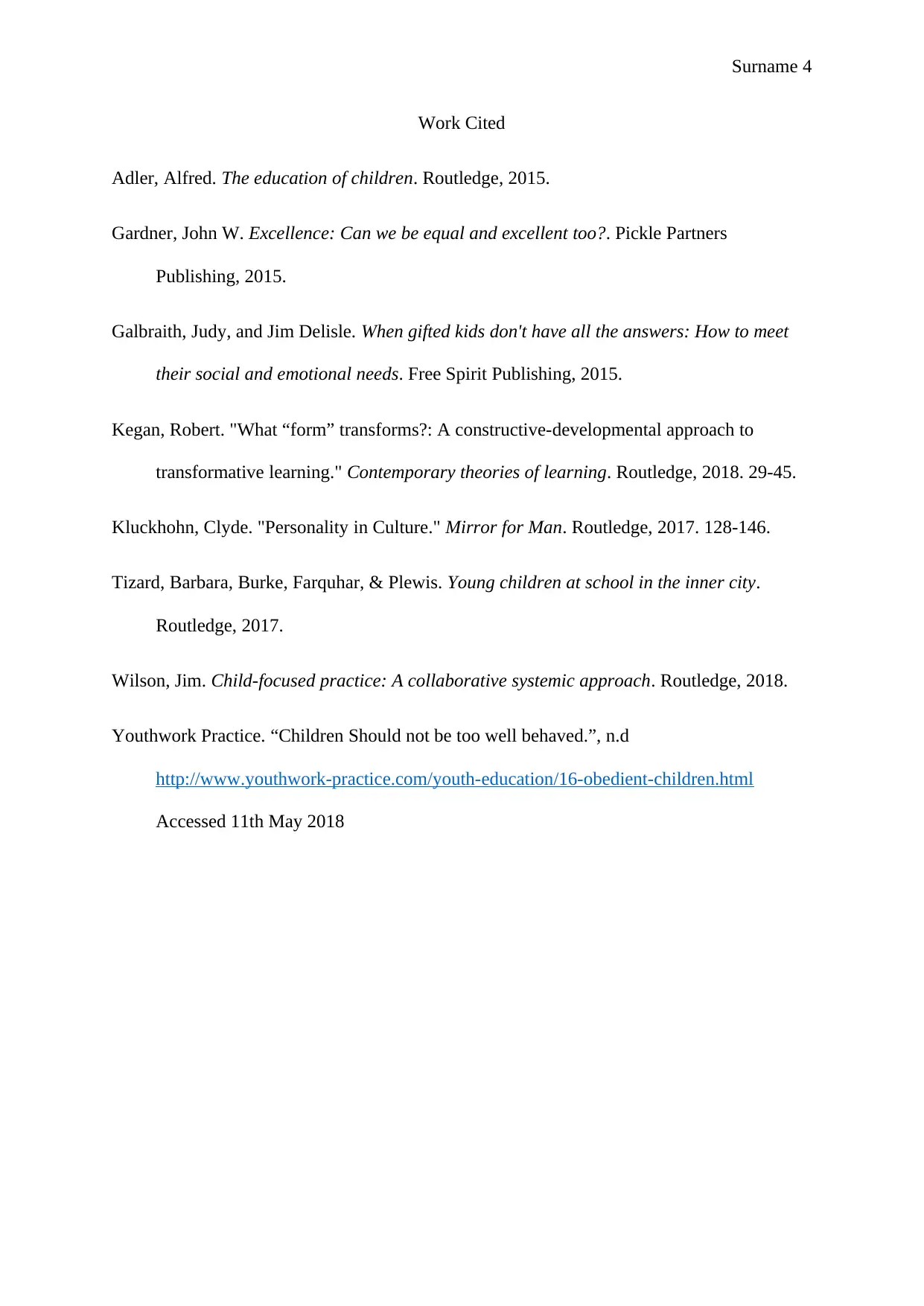Youthwork Practice: 'Children Should Not be Too Well Behaved' Analysis
VerifiedAdded on 2021/05/31
|4
|1158
|29
Essay
AI Summary
This essay provides an in-depth analysis of the Youthwork Practice article, 'Children Should Not be Too Well Behaved.' It examines the core argument that children should not always be excessively well-behaved to foster personality development and self-fulfillment. The essay delves into the importance of freedom, the potential negative impacts of overprotective parenting, and the significance of allowing children to make mistakes and learn from them. It explores different parenting styles, such as perfectionist parenting, and their effects on a child's independence and ability to navigate the world. The analysis highlights the benefits of a slightly rebellious nature for a child's personal connection with their individuality, emphasizing the importance of child development and good parenting. The essay also acknowledges the lack of statistical data in the article while underscoring the author's extensive knowledge on the subject and the well-presented arguments regarding child-rearing practices and the long-term consequences of adjusted children.

Surname 1
Students Name
Professors Name
Course Name
Dates
‘Children Should not be too well behaved’ by Youthwork Practice
Youthwork Practice article, ‘Children Should not be too well behaved' is such an
informative article. From the title of the article, one may get the wrong impression on what it
may be entailing. But after extensive reading of the article, a lot is cleared up and helps
enlighten the mind of the reader. The growing stage of a person is very important since it
shapes the person's entire life. Most of the behaviors exhibited by adults are as a result of the
patterns of there upbringing. The author of the article has covered very important facts in
relation to child development and the role the parents have in the growth of the child. This
has also included the importance of freedom to a growing child despite their tendency of
becoming unruly (Youthwork Practice). The author has faced the contradicting theme of
letting children become slightly unruly with the intent of shaping their future. Youthwork
Practice has shown vast knowledge in the field hence making this information more reliable
and authentic. According to Youthwork Practice, yes children should not be too well behaved
for the sake of their future. The freedom given to children helps them develop a personality
and enables the attain self-fulfillment in return as they grow into older age.
According to the article developing a personality involves the ability to stand on your
ground and term what you deem wrong or right (Kluckhohn). The overprotective parenting
may result in blind submission of the child in fear of the parent or with the intent to please the
parent. This affects the child's personality into a submissive person which may affect them as
they grow up and this may lead to them being misused by others or blindly following the
Students Name
Professors Name
Course Name
Dates
‘Children Should not be too well behaved’ by Youthwork Practice
Youthwork Practice article, ‘Children Should not be too well behaved' is such an
informative article. From the title of the article, one may get the wrong impression on what it
may be entailing. But after extensive reading of the article, a lot is cleared up and helps
enlighten the mind of the reader. The growing stage of a person is very important since it
shapes the person's entire life. Most of the behaviors exhibited by adults are as a result of the
patterns of there upbringing. The author of the article has covered very important facts in
relation to child development and the role the parents have in the growth of the child. This
has also included the importance of freedom to a growing child despite their tendency of
becoming unruly (Youthwork Practice). The author has faced the contradicting theme of
letting children become slightly unruly with the intent of shaping their future. Youthwork
Practice has shown vast knowledge in the field hence making this information more reliable
and authentic. According to Youthwork Practice, yes children should not be too well behaved
for the sake of their future. The freedom given to children helps them develop a personality
and enables the attain self-fulfillment in return as they grow into older age.
According to the article developing a personality involves the ability to stand on your
ground and term what you deem wrong or right (Kluckhohn). The overprotective parenting
may result in blind submission of the child in fear of the parent or with the intent to please the
parent. This affects the child's personality into a submissive person which may affect them as
they grow up and this may lead to them being misused by others or blindly following the
Paraphrase This Document
Need a fresh take? Get an instant paraphrase of this document with our AI Paraphraser

Surname 2
wrong crowd. But with a rebellious nature, the child is in a position to know what they want.
According to Youthwork Practice, a child who does not overstep the line is a highly adjusted
child, and this leads to loss of identity since they have to behave as the parents need them or
act as their parents need them to act (Youthwork Practice). This leads to a dependent lifestyle
where the child depends on what the parent requires of them. As they grow up, they tend to
retain the same trait hence lead to there nature which entails pleasing others. This affects the
chances of someone finding true happiness (Kegan). The nature of parenting also helps
determine the future career of a child. The article gives an excellent example of the secrete
serve, where a child has grown under strict supervision and can manage to follow all the rules
then they align with the society rules making them almost invisible since they abide by all the
expected rule (Tizard). For such a character then working at the secret service agency suits
them a lot.
Independence of the child is a concept that has received much focus in the article. The
view of parents and the freedom they offer the children. The children require this
independence to make mistakes and learn from them (Gardner). Different types of parents
have also been analyzed in the article, and we have come across the perfectionist parents. The
parents have a well laid out life plan for the children and the nature of parenting limits the
child independence of venturing outside the family plans. This significantly affects the child
since they don't get to venture out into the world and see the world in their own eyes. A
proverb, "who does not venture out will gain nothing" clearly explains the outcomes of note
giving the children that independence (Youthwork Practice).
The raised expectations from parents to children also dramatically impact the
development of the child. In accordance to the article, children have different characteristics
apart from being rebellious, know it all or others but for instance, the minute a character such
as a good child is labeled this greatly affects the child since they strive too hard not to
wrong crowd. But with a rebellious nature, the child is in a position to know what they want.
According to Youthwork Practice, a child who does not overstep the line is a highly adjusted
child, and this leads to loss of identity since they have to behave as the parents need them or
act as their parents need them to act (Youthwork Practice). This leads to a dependent lifestyle
where the child depends on what the parent requires of them. As they grow up, they tend to
retain the same trait hence lead to there nature which entails pleasing others. This affects the
chances of someone finding true happiness (Kegan). The nature of parenting also helps
determine the future career of a child. The article gives an excellent example of the secrete
serve, where a child has grown under strict supervision and can manage to follow all the rules
then they align with the society rules making them almost invisible since they abide by all the
expected rule (Tizard). For such a character then working at the secret service agency suits
them a lot.
Independence of the child is a concept that has received much focus in the article. The
view of parents and the freedom they offer the children. The children require this
independence to make mistakes and learn from them (Gardner). Different types of parents
have also been analyzed in the article, and we have come across the perfectionist parents. The
parents have a well laid out life plan for the children and the nature of parenting limits the
child independence of venturing outside the family plans. This significantly affects the child
since they don't get to venture out into the world and see the world in their own eyes. A
proverb, "who does not venture out will gain nothing" clearly explains the outcomes of note
giving the children that independence (Youthwork Practice).
The raised expectations from parents to children also dramatically impact the
development of the child. In accordance to the article, children have different characteristics
apart from being rebellious, know it all or others but for instance, the minute a character such
as a good child is labeled this greatly affects the child since they strive too hard not to

Surname 3
disappoint the parent but meet their expectations (Galbraith and Jim). This means the child
can not have his or her expectations. This implies that with such pressure placed on the child
the child loses track of any personal expectation they need (Adler). With a review of all the
content analyzed the child needs to be slightly rebellious so as to attain personal connection
with their individual personality. This is what is referred to as child development as well as
good parenting.
After an in-depth analysis of the article, it is evident that the author has extensive
information regarding the subject area. The provided argument clearly paints the author's
picture of how a child should be raised. It helps the reader understand the importance of
rebellious nature of children and why it is important. Understanding the meaning of adjusted
children and the disadvantages that occur later on in the child's future (Youthwork Practice).
One major shortcoming with the article is the lack of statistical data to strengthen the research
information by the author of the article. All the other basis of the article has been
exhaustively covered and the argument well presented. But the end question is, would you
request your child to be slightly rebellious?
disappoint the parent but meet their expectations (Galbraith and Jim). This means the child
can not have his or her expectations. This implies that with such pressure placed on the child
the child loses track of any personal expectation they need (Adler). With a review of all the
content analyzed the child needs to be slightly rebellious so as to attain personal connection
with their individual personality. This is what is referred to as child development as well as
good parenting.
After an in-depth analysis of the article, it is evident that the author has extensive
information regarding the subject area. The provided argument clearly paints the author's
picture of how a child should be raised. It helps the reader understand the importance of
rebellious nature of children and why it is important. Understanding the meaning of adjusted
children and the disadvantages that occur later on in the child's future (Youthwork Practice).
One major shortcoming with the article is the lack of statistical data to strengthen the research
information by the author of the article. All the other basis of the article has been
exhaustively covered and the argument well presented. But the end question is, would you
request your child to be slightly rebellious?
⊘ This is a preview!⊘
Do you want full access?
Subscribe today to unlock all pages.

Trusted by 1+ million students worldwide

Surname 4
Work Cited
Adler, Alfred. The education of children. Routledge, 2015.
Gardner, John W. Excellence: Can we be equal and excellent too?. Pickle Partners
Publishing, 2015.
Galbraith, Judy, and Jim Delisle. When gifted kids don't have all the answers: How to meet
their social and emotional needs. Free Spirit Publishing, 2015.
Kegan, Robert. "What “form” transforms?: A constructive-developmental approach to
transformative learning." Contemporary theories of learning. Routledge, 2018. 29-45.
Kluckhohn, Clyde. "Personality in Culture." Mirror for Man. Routledge, 2017. 128-146.
Tizard, Barbara, Burke, Farquhar, & Plewis. Young children at school in the inner city.
Routledge, 2017.
Wilson, Jim. Child-focused practice: A collaborative systemic approach. Routledge, 2018.
Youthwork Practice. “Children Should not be too well behaved.”, n.d
http://www.youthwork-practice.com/youth-education/16-obedient-children.html
Accessed 11th May 2018
Work Cited
Adler, Alfred. The education of children. Routledge, 2015.
Gardner, John W. Excellence: Can we be equal and excellent too?. Pickle Partners
Publishing, 2015.
Galbraith, Judy, and Jim Delisle. When gifted kids don't have all the answers: How to meet
their social and emotional needs. Free Spirit Publishing, 2015.
Kegan, Robert. "What “form” transforms?: A constructive-developmental approach to
transformative learning." Contemporary theories of learning. Routledge, 2018. 29-45.
Kluckhohn, Clyde. "Personality in Culture." Mirror for Man. Routledge, 2017. 128-146.
Tizard, Barbara, Burke, Farquhar, & Plewis. Young children at school in the inner city.
Routledge, 2017.
Wilson, Jim. Child-focused practice: A collaborative systemic approach. Routledge, 2018.
Youthwork Practice. “Children Should not be too well behaved.”, n.d
http://www.youthwork-practice.com/youth-education/16-obedient-children.html
Accessed 11th May 2018
1 out of 4
Your All-in-One AI-Powered Toolkit for Academic Success.
+13062052269
info@desklib.com
Available 24*7 on WhatsApp / Email
![[object Object]](/_next/static/media/star-bottom.7253800d.svg)
Unlock your academic potential
Copyright © 2020–2026 A2Z Services. All Rights Reserved. Developed and managed by ZUCOL.


